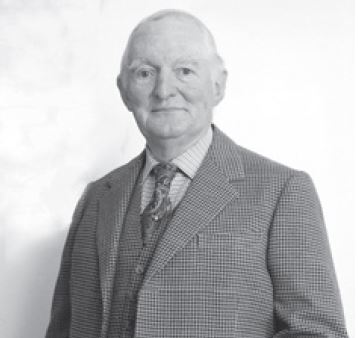Tom Tilbrook joined The 4th Hussars in 1948 when the Regiment was stationed at Colchester and was already under orders to sail to Malaya to assist in countering the Communist guerrilla campaign launched by the so-called Malayan Peoples’ Anti-British Army.

He was posted to A Squadron, then commanded by Loopy Kennard with John Strawson as second-in-command. Tom’s former service with the Coldstream Guards was of special value as ‘A’ Squadron was in the process of converting to armoured cars so he was the natural choice to lead the Assault Troop with its primarily dismounted role.
He tackled this task with great enthusiasm and during our pre-embarkation training on the Stanford Battle Area, where we practised fire and movement tactics with live ammunition, Tom was frequently heard threatening his troopers with dire consequences if they did not learn to deploy properly and not rid themselves of their deplorable habit of bunching.
His thorough training was to pay high dividends when put to the test in our efforts to tackle the business of bringing pressure to bear on the Communist terrorists or bandits in the jungle, villages and plantations of Malaya.
Shortly after The 4th Hussars arrived in Singapore in September 1948 and completed some hurried jungle warfare training, ‘A’ Squadron was despatched to Ipoh in Perak and after proper liaison with the police and the 2/2 Gurkha Rifles, began its operations. Soon afterwards Loopy Kennard was posted back to the UK and John Strawson assumed command of the squadron.
Tom’s troop was at first engaged in squadron operations which ranged from supporting the Gurkhas in squatter clearing tasks, patrolling the numerous minor roads and tracks through the vulnerable rubber plantations and mounting raids on suspected bandit camps. In one such affair, Tom’s troop was required to flush an area of jungle in the hope that bandits would then flee onto the waiting guns of other troops appropriately posted. Tom was concerned to impress on his squadron leader to need to ensure that his own men were not so engaged.
Tom’s troop was next sent on an independent mission to an area notorious for bandit activity and in cooperation with the police, he was to restore confidence and peaceful conditions, while continuing the hunt for terrorists. One of the key points here was to isolate the Communist gangs from their sources of food, information and money which they extorted from the village people. In this task, Tom was very successful and his many months’ activities culminated in an operation against a bandit camp with support from RAF rocket-firing fighters.
Tom’s particular brand of leadership was characterised by his example of courage and initiative, coolly weighing the odds, great thoroughness in acquiring information followed by meticulous planning and leading from the front. He continued to command his troop with great success throughout the Malayan campaign.
Back at Tidworth in 1951 and then in Hohne from 1953 onwards, Tom went from strength to strength, both as a squadron second-in-command, then as adjutant to Loopy Kennard, now commanding The 4th Hussars, during which time future amalgamation with The 8th Hussars was announced. Tom took
great pains in administering Loopy’s imaginative initiative in seeking civilian employment for those 4th Hussars who would be made redundant on amalgamation.
Next as a Queen’s Royal Irish Hussar, Tom commanded a squadron, went to the Staff College in 1960, and held a number of staff appointments before returning to the Regiment in 1965 to become second-in-command to John Paley, who had just succeeded John Strawson in command. Tom proved to be exceptionally loyal, able and effective support to his commanding officer. He further reinforced this excellent service as GSO1 in Berlin in the early 1970s, when among his other duties he was required to oversee a visit by HRH Princess Margaret, not always the easiest of VIPs to entertain.
Tom retired from the Army as a brigadier, bringing a most distinguished and dedicated service period to a close.
He was essentially a man of sound and likeable character, of absolute integrity and honesty, reliable, loyal and determined, with a ready sense of humour and a profound sense of duty.
This sometimes encouraged him to point out shortcomings in the Army’s administrative arrangements – to the extent that he earned himself the nickname of ‘Ticker Tom’. But his complaints were always well-founded and the measures taken for their removal benefited all.
One of the most admirable traits of his character was that when he really had something to tick about – his distressingly poor health during his last years – he retained his dignity, determination, good nature and interest in others.
His refusal to give in and to keep going, including a visit to Australia to see one of his sons, earned him the further respect and approbation of all.
Tom Tilbrook was a fine soldier, a true friend, and a great human being, missed now by all who had the good fortune to know him and serve with him. He never lost his deep feeling for The 4th Hussars and his Regimental comrades in arms, and he enjoyed enormously the annual dinners which during the last decade and more brought them all together.


